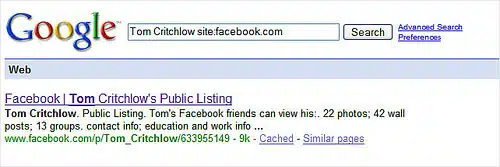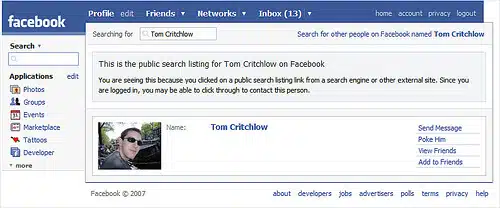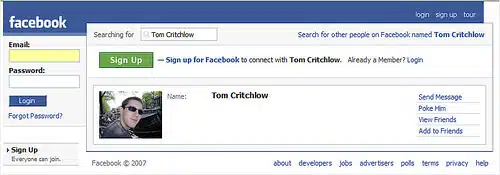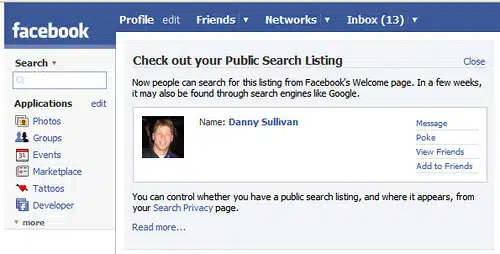Facebook Opens Profiles To Tap Into Google Traffic, While Google Grabs Facebook’s News Feed Idea
Google is getting a bit more like Facebook by enabling a Facebook-style news feed within its Orkut social networking site, while the king of the walled gardens Facebook acknowledges in actions (rather than words) that it really can’t go it alone without search engines like Google, as it prepares to let crawlers into its public […]
Google is getting a bit more like Facebook by enabling a Facebook-style news feed within its Orkut social networking site, while the king of the walled gardens Facebook acknowledges in actions (rather than words) that it really can’t go it alone without search engines like Google, as it prepares to let crawlers into its public user profiles. Actually, Facebook is telling its users that existing profiles already accessible to search engines will be exposed even more. Below, more on the moves, with lots of screenshots and explanations.
Facebook Says Public Listings To Be Made Crawlable
Public Search Listings on Facebook from the Facebook Blog covers how as of today, some limited user profile information — what Facebook calls a "Public Search Listing" — is being made available to anyone who comes to Facebook, regardless of whether they are logged in. This will include search engine spiders, as well. That means these listings should start showing up in Google, Yahoo, Microsoft Live and so on. From the post:
Starting today, we are making limited public search listings available to people who are not logged in to Facebook. We’re expanding search so that people can see which of their friends are on Facebook more easily. The public search listing contains less information than someone could find right after signing up anyway, so we’re not exposing any new information, and you have complete control over your public search listing.
In a few weeks, we will allow these Public Search listings (depending on users’ individual privacy settings) to be found by search engines like Google, MSN Live, Yahoo, etc. We think this will help more people connect and find value from Facebook without exposing any actual profile information or data.
Um — This Isn’t New!
I found the news confusing for many reasons. For one, I remember signing-up for Facebook before this announcement and seeing an area within the privacy settings allowing me to expose my profile to search engines or not, if I wanted. So this is new, as Facebook claims today? I don’t think so.
Indeed, Tom Critchlow at Distilled wrote about these options being live back in July. By the end of the month, by linking to his public listing using his name as the anchor text, he found that listing at Facebook ranking well within Google. Then by early this month, it was no longer ranking. He pondered whether Google was penalizing Facebook listings.
Well, the listing is still there in the index, as you can see here when doing a very specific search:
It’s just no longer ranking tops for his name, tom critchlow, as it was.
Back to that Facebook post. Remember how they said "in a few weeks" that these public listings would be allowed into public search engines? The fact that Tom’s in there now further underscores that this isn’t new. Moreover, look at what happens when you go to Tom’s public listing via Google:
See how it says "You are seeing this because you clicked on a public search listing link from a search engine or other external site." There’s already the expectation from Facebook that these listings will be in search engines or already are in them, rather than this being something that will happen within a few weeks.
FYI, that screen above is what you see if you’re logged in. You get a slightly different message if you’re not:
Facebook Probably Moving To Opt-Out On Profile Exposure
So what’s going on? I’ll follow up with Facebook, but I think the real situation is this:
- The public listings and settings to expose them to search engines have been in place for at least several weeks. They are not new out today.
- By default, I think these have been set to off, not to expose the listings.
- Today’s announcement is probably an heads-up that the default is being changed to on for all Facebook users without actually explicitly saying that.
- Most of these public listings are probably not in the search engines yet, since most people probably haven’t found or linked to their public profiles.
- Today’s announcement is also news that Facebook is going to do some SEO work to ensure search engines find these profiles.
I’m checking with Facebook further on these points and will update when I hear back.
Where IS My Public Listing?
Let me use myself as an example to explain things more. If you asked me for my profile on Facebook, I’d say it’s here. And that profile is listed in Google, if you do a narrow search like this:
See how there’s not the usual description? Nor is there a cached link? That’s a sign that this is a "partially indexed" URL at Google, a page it only knows about by seeing links to it, not by actually having crawled it (see Google Releases Improved Content Removal Tools and
Google Checkout’s Title Goes Missing On Google for more about these types of URLs).
What’s happened is that Google has found a link to my Facebook profile from somewhere (probably via my Sphinn profile page), tried to spider the Facebook page but wasn’t allowed in. So, it uses the anchor text title from that page (which is "Danny Sullivan") as the title of the page (and puts it into lowercase because of a bug/feature that the company continues to fail to fix).
But what about my so-called "public search listing." Well, that’s hard to locate. For example, when I went into Facebook today, I got a big notice at the top telling me I had one:
The problem is, I can’t "check out" my public listing as Facebook encourages me beyond looking at it in that notice because they gave me no link to it. Where’s it live?
If I go to my search privacy settings, there is a link that says "view my public search listing" next to the controls:
Clicking on that link doesn’t take me to the page. Instead, I get a pop-up showing me what it looks like, again with NO link to the page itself:
As you can see, I’ve probably had a public listing for weeks, just like Tom and perhaps other Facebookers. But I’ve never linked to it as I didn’t know where it was located. After even more hunting today, I still don’t see a link to it. Maybe I’m completely dumb, but that darn link isn’t noticeable.
To find it, I went back to Tom’s public listing. The URL looks like this:
OK, the /p/ part probably means that these are public listings, and his name is pretty obvious. As for the number, all Facebook private profiles have a number. So, I should be able to hack together my own URL, as long as I know my name (I do!) and my number (I do!):
And there I am. Danny Sullivan on Facebook:
Pros & Cons To Public Listing
Now that I’ve linked to my profile, it will get indexed by the search engines. Perhaps it might even start to rank well. Personally, I don’t mind this. Indeed, many people are discovering how social media sites can help them better control reputation management as a means of dominating the top results for their names (see 3 Ways Social Media Marketing Helps SEO for more about this).
If I did care, I could use that privacy setting to keep it out of the search engines — though that still won’t prevent a "partially indexed" URL from showing up. If search engines see even one link to these pages, you might end up with a listing. Again, Google Releases Improved Content Removal Tools not only explains the concept more, but it also covers the extra steps you need to take to get rid of these listings — though this generally will only work if the third party hosting service has physically removed the page or put up a robots.txt or meta robots block).
New Traffic For Facebook
Having my profile out there is good news for Facebook, because it will send some traffic their way. Indeed, some people search engines have long employed this tactic of tapping into name searches on other search engines to boost their business model.
Of course, it doesn’t help Facebook much if only a few people figure out how to hack up a URL linking to their public pages. That’s why my other points are important — Facebook will probably move to a default of "on" for exposing these pages (the more pages out there, the more traffic it can gather), plus it will probably set up a means for the search engines to find them (such as submitting sitemaps or making it possible for search engines to crawl further into the site from place like the network page to personal profiles).
This is a basic feature of SEO — you make your content crawlable to the search engines. But more important, Facebook has come under accusations of trying to build a walled garden, where everything happens from within Facebook rather than on the open web (Grokking Facebook: AOL 2.0 has a bit more of my thoughts on this). Some have even viewed Facebook as not needing Google or "external" services, since it has such a compelling network and hive of activity internally.
Facebook: Loving SEO & Google
Guess not. Facebook clearly needs and wants that external exposure, or it wouldn’t be making this move. Indeed, it’s even more ironic that only two months ago, Facebook talked about being the most used people search engine on the web. My Facebook One Of The Top Search Engines? I Dunno About That! post looks at this more with some skepticism. That now grows when by putting profiles out into Google and other major search engines, Facebook acknowledges that it is far from the only place people are looking for other people.
So Facebook needs Google, or at least its traffic. But what about all that noise recently about Google needing Facebook. Skip past the chatter regarding the social graph improving search. Last month, Google vice president of search products and user experience Marissa Mayer talked with me about being intrigued by Facebook and wanting to do some of the things that Facebook does, not to mention saying it was her favorite non-Google service (see here and here and here).
Of course, Google has its own long-standing social network, Orkut. Even I will joke along with others about it seeming to be big in Brazil, Iran and nowhere else. But in another interview recently (read here; listen here), Mayer fairly points out that it is the second largest social network world wide.
Google: Nice Idea Facebook, Can We Have A News Feed For Orkut?
That leads us to Google borrowing from Facebook. One of Facebook’s most compelling features is the news feed, a terrible name for those who think "news feed" means an RSS feed you subscribe to. "Friend Feed" would be a better name, since the news feed is a running update of what your friends are doing on Facebook, like this:
Now Orkut is getting its own friend feed, as explained on the Orkut blog:
Starting today you may see a "Updates from your friends" box on the homepage where you’ll get real-time updates when your friend Divya has a new address, when Priya has uploaded a new favorite YouTube video, or Amar has posted his new photos. Any changes you make will show up on your friends’ homepages as well, so they can be the first to wish you best of luck at your new job, or or send you a scrap about the photo from your latest vacation.
I checked my Orkut profile and don’t see it live there yet, so can’t show you an example. Orkut says it will be coming out for various users over the next few days.
Postscript: Techmeme has more discussion here, and Amit Agarwal points out you can see that more than 25,000 public listings are already in Facebook.
Postscript 2: John Battelle also seems to have gotten a FAQ from the PR department that says, "In addition, we are informing all users that external indexing will occur in approximately one month, so they have time to adjust their privacy settings." Oops — plenty of users are already indexed, of course — though the privacy settings they chose should have initially told them this would happen. Those are the settings that are supposedly new out now but have actually been in place for some time.
Postscript 3: 4 Questions & Answers You Should Know About Facebook’s Public Search Listings goes into more depth about how these listings will be distributed to search engines plus how most members were effectively opted-in to them well before the Facebook announcement
Opinions expressed in this article are those of the guest author and not necessarily Search Engine Land. Staff authors are listed here.
Related stories
New on Search Engine Land








